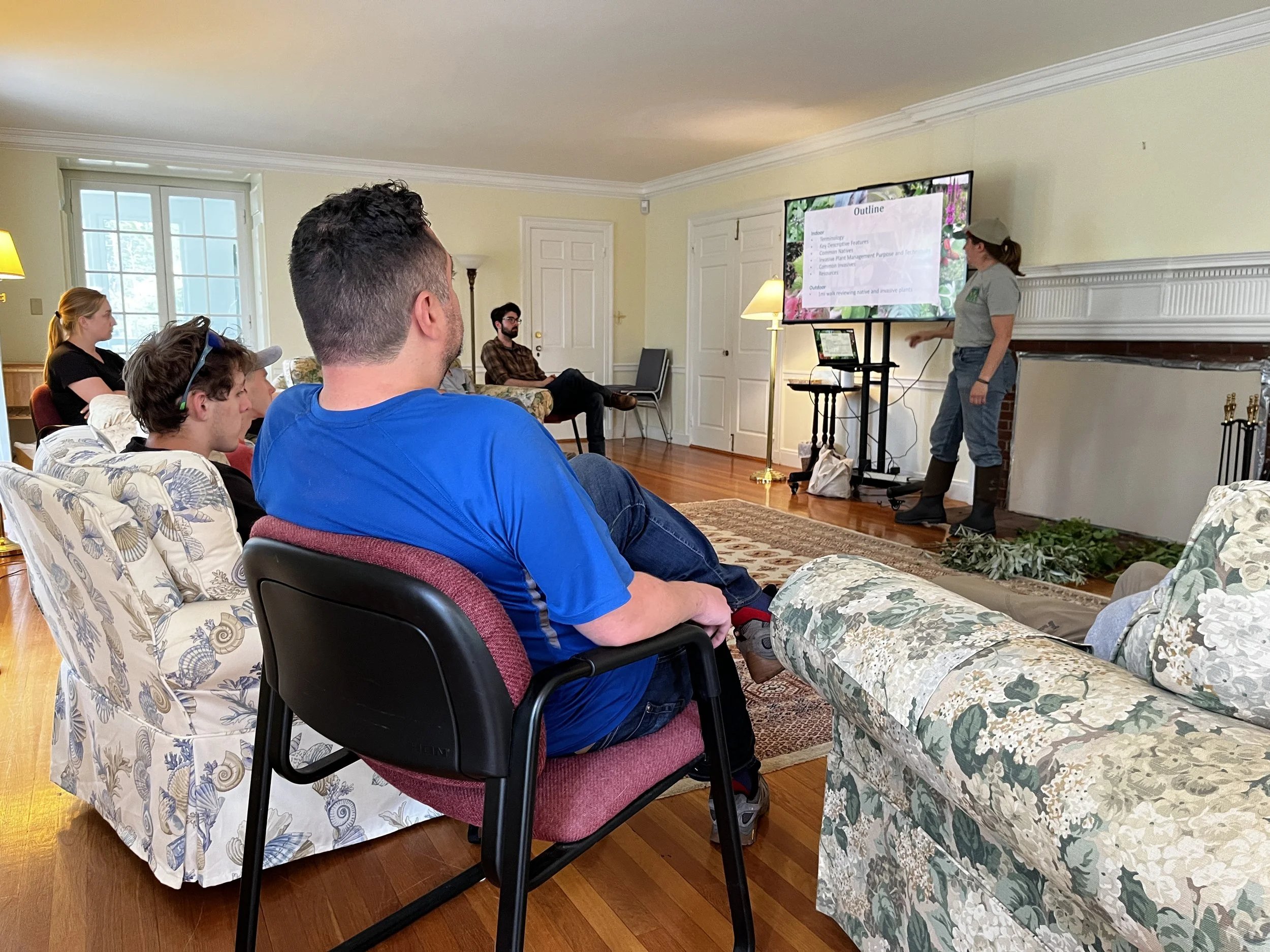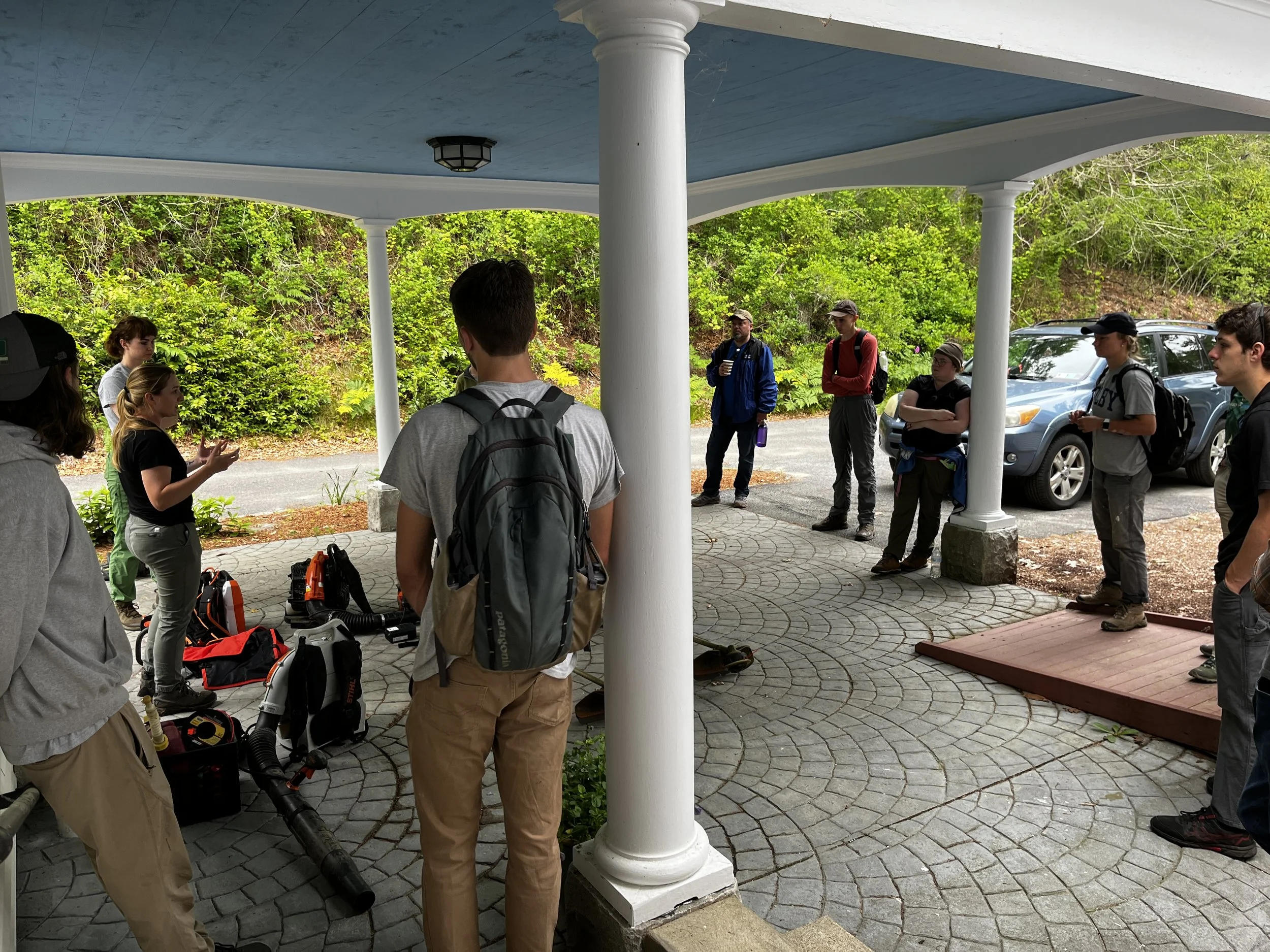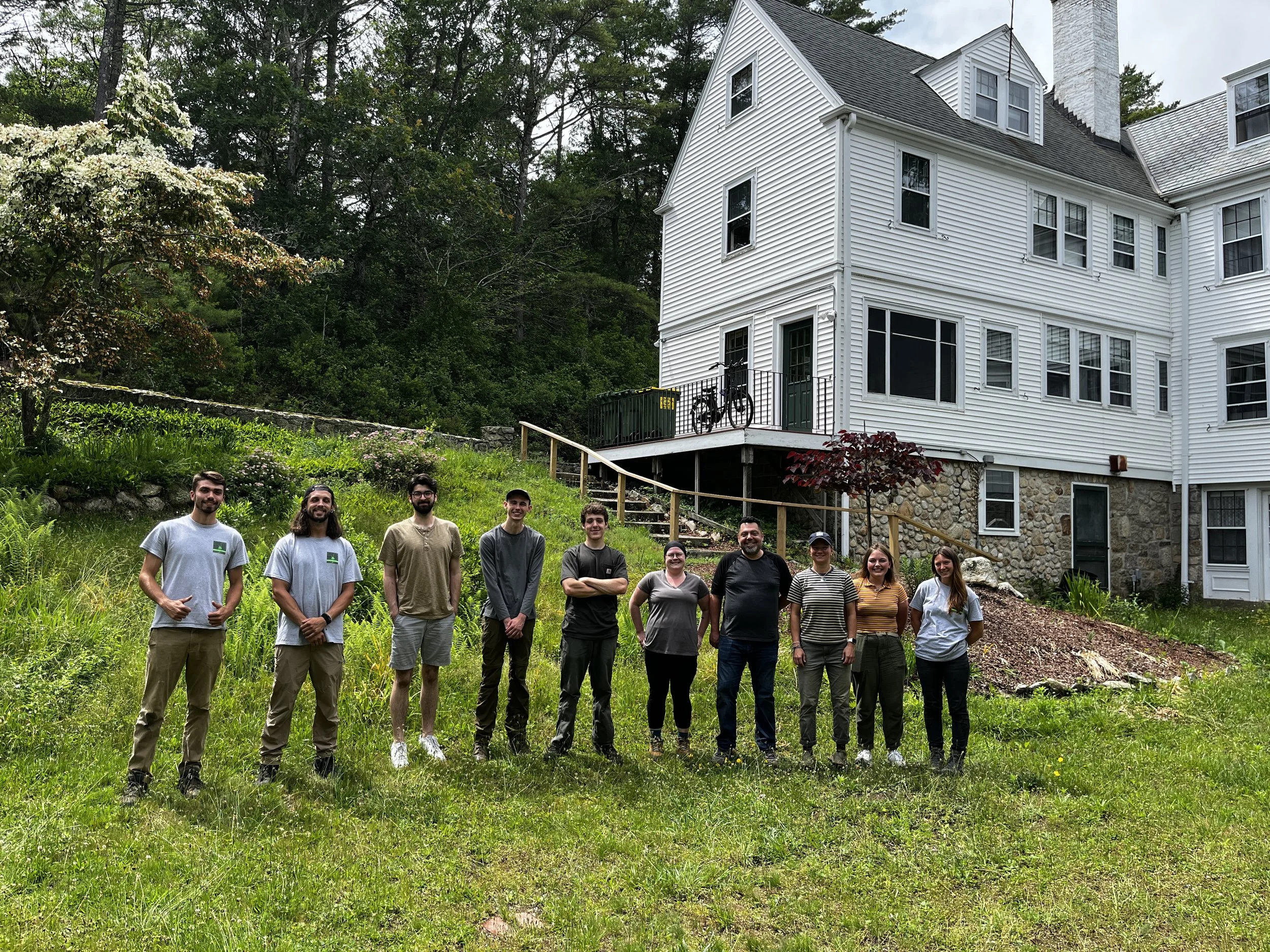What’s New at Wildlands
Seasonal Land Stewards Hone Skills at STC
By Thomas Patti, Communications Coordinator
Late last month, our burgeoning Stewardship Training Center (STC) reached a major milestone in its mission to build land stewardship capacity across the state.
On June 26 and 27, Wildlands Trust hosted its first Seasonal Land Steward Training at the STC. Ten trainees, each holding a land stewardship role this summer with a city, town, or environmental nonprofit, converged on the STC from across Massachusetts to gain invaluable conservation skills and expand their professional network. The program, reviewed positively by participants, marks the first in hopefully a long line of initiatives at the STC to support the sustained care of conservation lands, especially during peak periods of human use.
“I am extremely excited to have had the opportunity to bring this group of seasonals together,” said Wildlands Stewardship Coordinator Zoë Smiarowski. “I think all of the participants worked extremely well collaboratively and learned from each other and the instructors in the most positive way.”
The training began bright and early on Monday morning with a group hike and trail maintenance workshop at our Halfway Pond Conservation Area, the setting of the STC. Leading the workshop were Mary Doucette of the Buzzards Bay Coalition and Colleen Andrews of Mattapoisett Land Trust. Around midday, Mary and Colleen were joined by Zoë to teach trainees how to care for stewardship tools. After lunch, trainees honed their invasive plant identification and removal skills through a presentation and hike led by Kelly Barber of Barnstable Land Trust.
Kelly Barber of Barnstable Land Trust leads an invasive plant identification walk.
On Tuesday, Chris Crowther of Certified Rescue Courses trained program participants in first aid and CPR. Trainees then learned to build wooden benches during a carpentry workshop led by Wildlands staff. Finally, Nate Cristofori and Michael Cahill of the Plymouth Department of Marine and Environmental Affairs presented to the group about interacting with the public on conservation land.
“I look forward to continued and new collaborations with the wide range of talented conservation professionals and volunteers in the region,” Zoë said about the STC. “I feel extremely fortunate to be a part of the community here in Southeastern Massachusetts and I'm excited to see all the creative projects that come together for the betterment of our lands and waters.”
Thank you to all who attended our program, and to the guest instructors for providing their passion and expertise! Wildlands Trust looks forward to working with these and new partners as the STC marches forward in its first full year of operation.
To learn more about the STC and browse upcoming events, visit our Training page.
Click through the gallery below to view more photos from the 2023 Seasonal Land Steward Training.













Spring 2023 Land Acquisitions Update
By Scott MacFaden, Director of Land Protection
The Lake Street CR includes frontage on Jones River Brook, a tributary of the Jones River (pictured). Photo by Jimmy Powell of Jones River Landing.
Thus far in 2023, we’ve completed several projects that protect a diverse array of habitats and conservation values, and in one case further strengthen a long-standing collaboration with one of our municipal partners.
Lake Street CR, Plympton
In January, we completed a 31-acre Conservation Restriction in northeast Plympton near the Kingston line. The CR area is part of a larger privately owned property that will include a solar energy installation. Because the proposed project site is within mapped habitat for the Eastern Box Turtle, a species of “Special Concern” as identified by the Commonwealth’s Natural Heritage and Endangered Species Program (NHESP), the project proponents were required to grant the CR.
The CR protects land identified by NHESP as containing significant wildlife habitat, including “Priority Habitat of Rare Species” and “Estimated Habitats of Rare Wildlife.” The CR land includes frontage on Jones River Brook, a tributary of the Jones River.
As solar projects continue to proliferate across Southeastern Massachusetts, those that are proposed within areas subject to NHESP’s regulatory purview typically require the granting of a CR. We are actively evaluating several other solar project-associated CR’s across the region, and expect we will be offered more projects of this type in the future.
McCarthy Farm Conservation Area CR, Rockland
In March, we secured a Conservation Restriction (CR) on 36 acres in southwest Rockland. The Town of Rockland acquired the parcel in late 2021 using Community Preservation Act and other state funds. To learn more about the history and natural profile of the property, click here.
Sleeper Conservation Area CR, Hanson
The Bay Circuit Trail, a 200-mile hiking path that lies near the Sleeper Conservation Area in Hanson. By John Phelan, CC BY 3.0
In April, we completed a 12-acre Community Preservation Act (CPA) CR on the Town of Hanson’s Sleeper Conservation Area. Acquired by the Town in 2022 with a combination of CPA funds and a Local Acquisitions for Natural Diversity (LAND) grant from the Commonwealth of Massachusetts, the Sleeper Conservation Area primarily comprises forested upland, punctuated by several isolated pockets of wooded deciduous wetland.
The Sleeper Conservation Area’s position within the broader landscape bolsters its conservation impact. It directly abuts the Town of Hanson’s Camp Kiwanee, a long-cherished community asset on Maquan Pond, as well as the Town’s Alton J. Smith Preserve and the neighboring Town of Pembroke’s Town Forest. The preservation of the Sleeper Conservation Area thus strengthens the landscape connectivity between these two municipally owned open space assemblages.
A section of the Bay Circuit Trail, the premier long-distance hiking trail in Eastern Massachusetts, runs just to the west of the conservation area. Preserving this parcel helps protect the scenic integrity of the trail’s corridor and maintain the recreational value of this regionally and historically significant footpath, a chronological contemporary of the Appalachian Trail.
In addition to its favorable landscape context, significance for wildlife corridor connectivity, and proximity to the Bay Circuit Trail, the Sleeper Conservation Area also contributes to water resources protection. The parcel lies within multiple areas identified by the Massachusetts Department of Environmental Protection as significant for drinking water and aquifer protection, and sits near Great Sandy Bottom Pond, which provides drinking water for the neighboring towns of Rockland and Abington.
The LAND grant award was critical to obtaining the support of Hanson Town Meeting voters for the project. The award provided almost two-thirds of the project’s funding, with CPA funds providing the balance. As part of our ongoing partnership with the Town of Hanson, Wildlands staff helped prepare the LAND grant application and provided additional assistance as needed. Many thanks to Hanson Conservation Commission Chair Phil Clemons, whose indefatigable efforts ensured the project’s success. Phil has served as our primary contact person in Hanson for decades, and is a true champion of all things conservation.
Upcoming Projects
We’re working to close more acquisitions over the next several months, including projects in Middleboro, Bridgewater, and Rehoboth. Stay tuned!
Get Involved
Hoping to protect your property’s natural and cultural heritage for generations to come? Learn about Conservation Restrictions, Deed Restrictions, land donations, and more on our Conserve Your Land page.
Wildlands to Launch New Training Center
The Stewardship Training Center will advance land conservation through skill-building for volunteers and continuing education for professionals.
The Stewardship Training Center will advance land conservation through skill-building for volunteers and continuing education for professionals.
Plans for the Wildlands Trust Stewardship Training Center are coming together thanks to the guidance of wise land professionals from far and wide.
In December 2022, Massachusetts joined 17 other states in establishing an Office of Outdoor Recreation. This is good news for Wildlands Trust, our members, and the growing numbers of people discovering hiking, biking, birding, kayaking, and other passive recreation as a means for achieving mental and physical health.
“Whether it’s a weekend camping trip with the family, a bike ride with friends, or a hike through a state park, spending time outdoors is beneficial to our physical and mental wellbeing,” said Baker Administration’s Secretary of Energy and Environmental Affairs Beth Card. According to a 2021 report from the U.S. Bureau of Economic Analysis, the outdoor recreation economy accounted for $9.5 billion in value added to the Massachusetts economy.
But, with a growing focus on getting more people out into nature, Wildlands and other land-holding entities are concerned that expectations around the care and management of our open spaces will be an added burden on an already stressed and under-resourced land stewardship system. Strapped resources for stewardship are the norm at our State Parks, on our townlands, and on land trust properties. Without additional funding and innovation directed toward caring for land, we risk an erosion of public confidence and the degradation of the biological and social values we seek to protect, especially as more people are encouraged to hit the trails.
Responding to the need for more and better stewardship of our public lands, Wildlands Trust is taking the lead to establish a Stewardship Training Center (STC) focused on developing volunteer land stewards. Programs at the STC will also promote continuing education of professional staff involved in land protection. An advisory committee comprised of conservation professionals and highly experienced volunteers has been convening monthly since the fall of 2022 to advise Wildlands Trust on its nascent STC concept.
Halfway Pond Conservation Area, Plymouth, MA
Located on Halfway Pond in Plymouth, Massachusetts, the Stewardship Training Center will offer a wide range of training programs to (1) help municipalities, and land-holding organizations build stewardship capacity and (2) encourage continuous learning for professional practitioners.
Wildlands Trust has developed an exemplary stewardship model that blends professional staff with reserves of trained volunteers. Well-trained and committed volunteers help Wildlands ensure that we fulfill our obligation to steward the lands in our care and custody. We believe that more towns and land trusts could benefit significantly by building teams of trained volunteers to provide leadership and labor.
The Property will be available to other organizations that would like to offer trainings related to the mission of the Stewardship Training Center.
To receive more information about the opportunities available at the Stewardship Training Center, sign up for our email list.
Thank You and Farewell to Mitch Hennings
Land Steward for Wildlife and Habitat Mitch Hennings ended his time with Wildlands Trust this month to pursue a career in physical therapy.
Land Steward for Wildlife and Habitat Mitch Hennings ended his time with Wildlands Trust this month to pursue a career in physical therapy.
Mitch joined Wildlands after completing his degree in Environmental Science at the University of New England in May of 2021. After a successful summer as a Seasonal Land Steward, Mitch became a full-time staff member and resident bird and wildlife enthusiast. During his year and a half with Wildlands, he piloted Wildlands’ bird box monitoring program at Cushman Preserve in Duxbury, led stewardship projects for our youth Green Team at D.W. Field Park in Brockton, and attended the ALPINE Summer Institute in Cambridge, where he completed a research project about local cranberry bog restoration.
Mitch enjoyed working outside with his hands and will miss spending time at the more remote preserves that people don’t often see. At Wildlands, we will miss his work ethic and contagious smile. The next stop for Mitch is Quincy College, where he’ll spend the next two years in the Physical Therapy Assistant program while working as a Certified Nursing Assistant. Please join us in thanking Mitch for his time and hard work and wishing him success in his new career!
Click here to read Mitch’s ALPINE Summer Institute research project on cranberry bog restoration.
McCarthy Farm Conservation Area in Rockland Dedicated
On October 21, the Town of Rockland dedicated its newest open space preserve—McCarthy Farm Conservation Area.
By Scott MacFaden, Director of Land Protection
On October 21, the Town of Rockland dedicated its newest open space preserve—McCarthy Farm Conservation Area. Comprising 36 acres in extent, the Farm is situated on the west side of Beech Street in southwest Rockland, bordering the Town of Hanson and closely proximate to the southeast corner of the Town of Whitman.
Rockland Open Space Committee Chair Don Cann Makes Short Work of the Ribbon
Until recently, McCarthy Farm was one of two remaining active farms in Rockland and one of the largest remaining unprotected, privately-owned properties in the town—thus a high priority for preservation.
Louise McCarthy and her family acquired the property in 1952 and maintained a small-scale working farm for many decades. Among other agricultural endeavors, the McCarthys raised chickens and cultivated various types of flowers.
With Louise’s departure from the premises several years ago due to ill health, the property was effectively abandoned, and its era as an active farm relegated to history. In March 2021, Louise’s heirs entered into a purchase and sale agreement with a developer who sought to convert a portion of the farm into 36 units of residential housing. Fortunately, the farm was enrolled in Chapter 61A, and the Town therefore retained a right of first refusal on the property. The Chapter 61 Programs allow owners of qualifying open space lands, including farm and forestland, to receive significant reductions in their property tax assessment in return for keeping their land undeveloped. Chapter 61 is for forestland, Chapter 61A is for agricultural land, and Chapter 61B encompasses open space lands not falling into either of the other two chapters. Municipalities retain a right of first refusal to purchase land enrolled in any of the Chapter 61 programs if the landowner seeks to sell their land for development or develop it themselves.
Rockland open space preservation advocates successfully mobilized an effort to encourage the Town to exercise its first refusal rights, and after considerable deliberation the Town’s Board of Selectmen did vote to exercise that right.
Rockland voters approved the purchase of the farm at a Special Fall Town Meeting on September 13, 2021, and the Town closed on the land on December 29, 2021. The Town used a combination of Community Preservation Act (CPA) funds and “LAND” Grant funds from the Commonwealth of Massachusetts to acquire the property. As part of ensuring compliance with CPA requirements, the Town is granting a Conservation Restriction (CR) on the property to Wildlands Trust. This CR will represent Wildlands’ first acquisition of any kind in the Town of Rockland, and we are pleased to welcome the town as a partner in our regional land preservation efforts.
Despite its history as a working farm, the majority of the property is wooded. The area that was farmed is along the property’s southerly boundary and adjacent to the former McCarthy farmhouse. A small pond that was likely expanded and deepened during the McCarthys’ tenure is in the approximate center of the property. The summit of the 122-foot-high Rye Hill is located in the property’s southwest corner. It also includes at least two potential vernal pools.
Topography ranges from level to gently rolling. Pockets of wetland habitat are interspersed throughout, with the largest area of wooded swamp in the property’s southeast corner. Two intermittent streams flow through the property that are tributaries of French’s Stream, a North River tributary.
The property now includes a trailhead parking area and an approximately one-mile hiking trail loop that provides visitors with ample opportunities to enjoy a leisurely woodland stroll.
McCarthy Farm Conservation Area sits within a corridor that includes numerous undeveloped parcels, some of which are preserved. Directly abutting to the west is a 10-acre parcel owned by the Town of Rockland, and directly abutting to the north and northwest, respectively, is a 30-acre undeveloped parcel owned by the adjacent Town of Whitman that was formerly part of a Girl Scouts Camp, and a 12-acre privately owned undeveloped parcel. In the larger landscape context, there is the potential for future connections to the Town of Rockland’s Beech Street Conservation Area, situated approximately 0.6 mile to the northwest.
Congratulations to all the town officials and volunteers whose collective efforts ensured McCarthy Farm’s permanent preservation. Town Administrator Douglas Lapp, and particularly the members of the Rockland Open Space Committee, deserve special mention for their unceasing commitment to the preservation effort. We at Wildlands have an acute understanding of how difficult it can be to protect land enrolled in Chapter 61A within the crucible of a proposed conversion to development, a process that in many ways places all concerned under significant logistical, financial, and temporal duress. Future generations of Rockland residents will owe a debt of gratitude for the perseverance of those who accepted the challenge of preserving McCarthy Farm.










